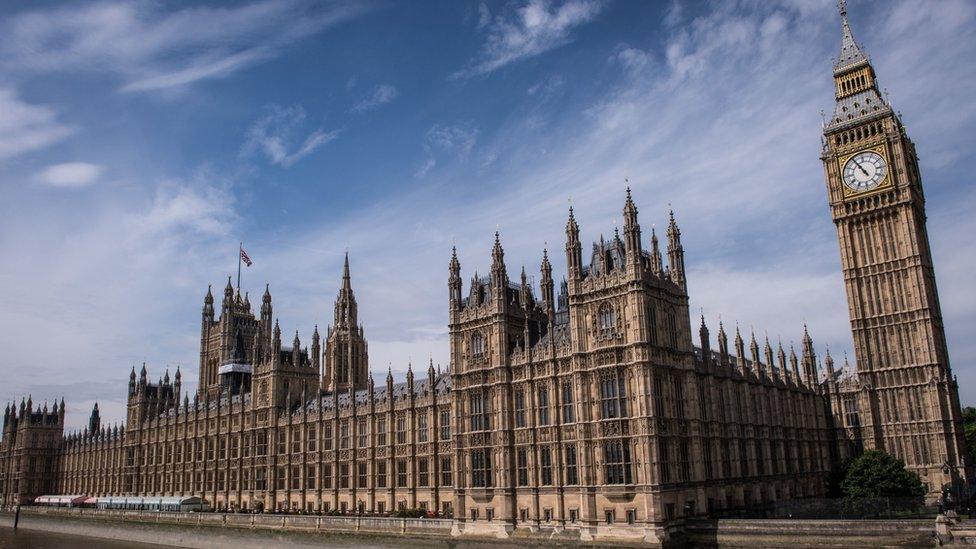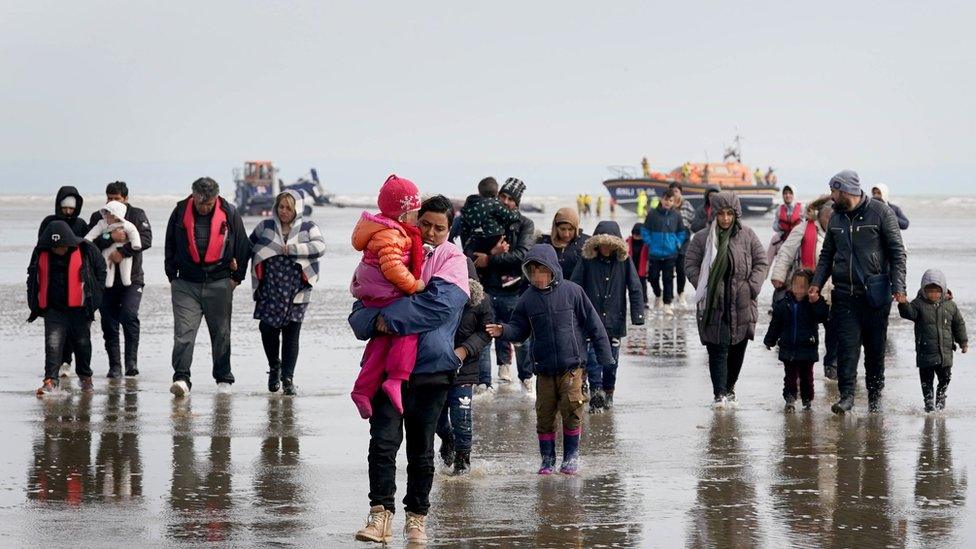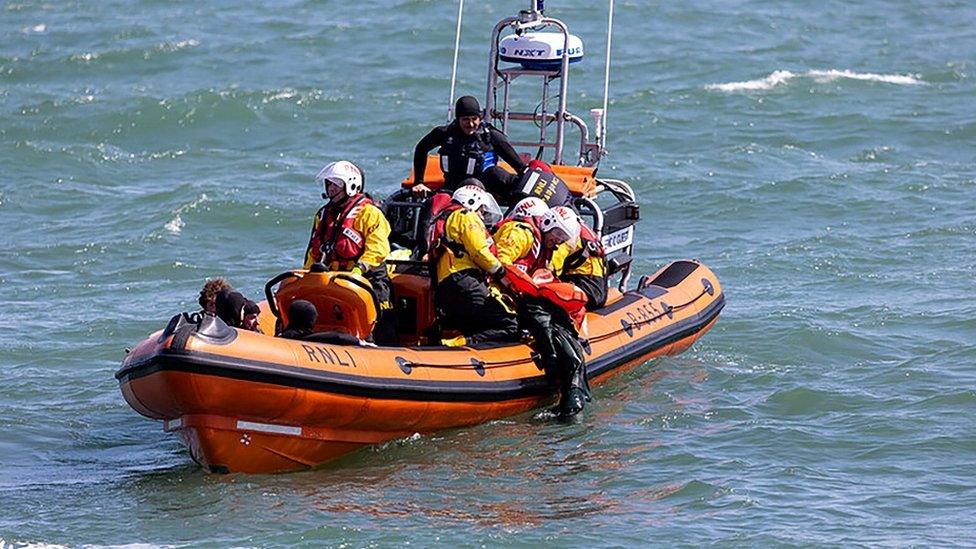What's happening in Parliament this week?
- Published

The heaviest legislative action will be around the Illegal Migration Bill, where peers look likely to add to the four defeats they've already inflicted on the government (details below).
With the government keen to get its bill through unscathed, the expectation is that there will be a rapid ping-pong exercise, possibly involving several rounds of amendments bouncing between the Commons and Lords in a single day.
In this case, there could be as many as 14 issues in play, but expect that number to come down rapidly, with the strongest Lords resistance likely to be on those amendments involving respected crossbenchers and bishops, as well as Labour and the Lib Dems. But all sides understand the political heat generated by this issue, so the wider political picture will inform their tactics.
Between processing amendments from peers, MPs will spend much of their week on Estimates Day debates. The constitutional theory is that this is how government spending is approved by the Commons; the practice is that the debates focus on specific issues identified by select committees - and the great mass of spending is approved in brief, empty, legislative rituals.
There's plenty of important committee action. Environment, Food and Rural Affairs Committee is trying to set up an evidence session on the crisis facing Thames Water, with minister Rebecca Pow, regulators and current and former Thames Water managers - as I write, the timing and details have not been settled.
Monday 3 July
Commons: (14.30 BST) Home Office Questions. Any Government statements or urgent questions will follow from 15:30 (the NHS workforce plan looks a likely candidate).
The main debate will be the second reading of the Economic Activity of Public Bodies (Overseas Matters) Bill: this is aimed at local councils and other public bodies disinvesting in Israel - although the bill will provide for a wider ban on political or moral disapproval of foreign states "influencing certain economic decisions".
Labour has fired back a fatal amendment to try to block the bill. It acknowledges there have been "selective and biased" campaigns against Israel, but warns the bill could stop public bodies supporting Uyghurs and other groups facing persecution.
Westminster Hall: (16:30) MPs debate e-petition 600966, calling for the government to increase the HMRC Mileage Rate from 45p per mile to 60p per mile - it notes the rate has been the same since 2011. The petition attracted 41,589 signatures.
Committees: Public Accounts (16:00) quizzes senior officials from the Department of Health and Social Care on access to urgent and emergency care.
Justice (14:30) questions Director of Public Prosecutions Max Hill KC on issues including long delays in court cases coming to trial, the investigation and prosecution of rape, and tensions between the Crown Prosecution Service and the police.
Lords: (14:30) The main debate will be the report stage (day 2 of 3) of the Illegal Migration Bill. This will include three votes held over from Wednesday, when the electronic voting system, perhaps overheated by the volume of government defeats, failed.
They cover protection of LGBT people, the length of detention, and requiring the home secretary to consider a protection claim or a human rights claim where someone has not been removed from the UK within six months of the claim being deemed inadmissible.

The Illegal Migration Bill is the government's key measure to tackle small boat crossings
There could be four more votes after that: on protection for women, and victims of trafficking, the period of detention, and unaccompanied children.
Tuesday 4 July
Commons: (14:30) Energy Security and Net Zero Questions, followed by a Ten Minute Bill presented by former Defence Secretary Gavin Williamson, to recognise the Republic of Somaliland, a breakaway state (from Somalia) in the Horn of Africa.
The main event will be an Estimates Day debate, on spending by the Department of Work and Pensions, followed by the Ministry of Justice's spending on the Prisons and Probation Service.
Westminster Hall: (09:30) Labour's Yasmin Qureshi leads a debate on Srebrenica Memorial Week.
Committees: (14:00) Rishi Sunak is before the Liaison Committee, external, the super-committee of select committee chairs, for one of its regular hearings questioning the prime minister. It will cover Ukraine and security matters, the cost of living, public services, constitutional matters, and the net zero strategy/COP28.
Environment Food and Rural Affairs (14:30) looks at "puppy farming" and the unregulated importing of puppies into the UK, and the mutilation of domestic animals, such as the ear-cropping of dogs and de-clawing of cats.
Health (10:00) continues its assisted dying inquiry with evidence from Minister of State Helen Whately.
Lords: (14:30) Peers will zip through a series of legislative chores - rapid, perfunctory committee consideration of private members bills, followed by brief third reading rubber-stampings of the Northern Ireland Troubles (Legacy and Reconciliation) Bill, and the Economic Crime and Corporate Transparency Bill. In both cases, some amendments will have to go back to MPs.
That process has already taken place with the Strikes (Minimum Service Levels) Bill, where a series of government defeats have been reversed in the Commons. The word is that peers will fire back a single amendment, bundling up their remaining concerns into a call for a consultation on unfair dismissal.
For dessert, peers will whiz through all stages of the Finance (No. 2) Bill, the measure that enacts the tax changes made in the Budget - as a money bill, Peers don't make any changes.
Wednesday 5 July
Commons: (11:30) Wales Office Questions, followed at noon by Prime Minister's Question Time.
The main debate will be another Estimates Day one, this time on the Department of Energy's work on energy infrastructure, followed by the Department for Education's spending on adult education, post-16 education, and further education colleges.
The day will end with the ritual approval of "all outstanding estimates" - billions of pounds of public spending approved in the blink of an eye.
Westminster Hall: (09:30) Labour's Kate Osamor leads a debate on the criminalisation of victims of violence against women from ethnic minority and migrant communities; Conservative Gareth Johnson (14:30) has a debate on freehold and leasehold reform in England, in the wake of a government decision not to push forward with legislation.
Committees: Environmental Audit (14:15) hears from Chief Medical Officer for England Professor Sir Chris Whitty on air quality targets, following his recent annual report which focused on air pollution. Are cleaning products, wood burners and gas cookers bad for your health?
Lords: (15:00) The main debate will be the report stage (day 3 of 3) of the Illegal Migration Bill. Expect votes on another three amendments: on a duty to provide safe and legal routes for migrants; on a requirement for the National Crime Agency to tackle organised criminal gangs involved in illegal migration; and on the Archbishop of Canterbury's amendment to require the home secretary to produce a 10-year strategy for international cooperation to tackle refugee crises. The idea is to move the focus beyond the immediate crisis, to the underlying international issues.
Thursday 6 July
Commons: (09:30) Environment, Food and Rural Affairs Questions, followed by Questions to the Attorney General, and the weekly Business Statement setting out the following week's Commons agenda.
After another bit of legislative ritual around government spending, with the rubber-stamping of the Supply Questions and Appropriation (Main Estimates) (No. 2) Bill, the main events will be backbench debates on building safety and social housing, to mark six years since the Grenfell Tower fire, and on the role and status of the Commonwealth Parliamentary Association.
Westminster Hall: (13:50) The SNP's Tommy Sheppard leads a debate questioning the presence of bishops in the House of Lords
Lords: (11:00) Peers will debate the report stage (day 1 of 4) of the Online Safety Bill. This promises to be a much more consensual affair than other recent report stages. with an outbreak of agreement about the content of much of the bill. Watch or government amendments reflecting deals over issues where peers (and MPs before them) have been lobbying.
The first example is digital minister Lord Parkinson, who has an amendment creating new offences of sharing or threatening to share intimate photographs or films, responding to a long campaign headed by former Culture Secretary Dame Maria Miller. Watch out for further compromises on other issues.
Friday 7 July
Lords: (10:00) Peers will debate the 75th anniversary of the arrival of the Windrush generation. Normally combative Home Office minister Lord Murray of Blidworth leads for the government.
Peers will also debate a report from the Communications and Digital Committee: At Risk: our creative future. Conservative Baroness Stowell of Beeston will lead. Her committee's report accused ministers of a "complacent" approach which risked jeopardising a successful sector of the economy.
- Published29 June 2023

- Published27 June 2023

- Published29 June 2023

